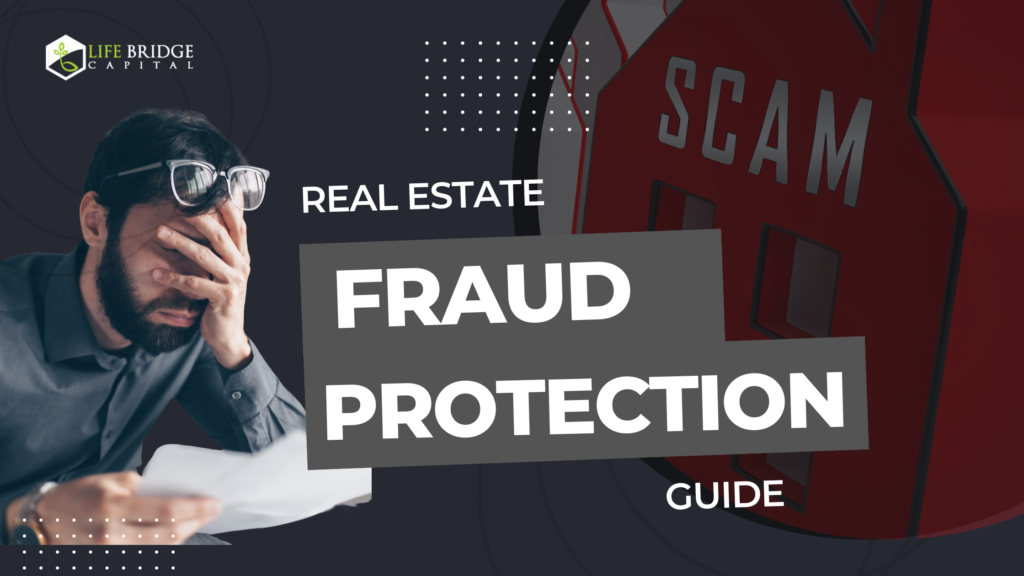
Real estate investment deals in high-value assets, which naturally makes it appealing to criminals. Unfortunately, some investors do find themselves victims of sophisticated fraud schemes. Still, the fear of a wrong mouse click should not deter anyone from taking advantage of the real estate market. Instead, use this guide to stay safe while growing your portfolio.
Life Bridge Capital is a leading real estate syndication company. We offer our investment partners the opportunity to leverage shares of multifamily rental properties into a passive monthly income. Learn More
Look Twice Before Sending a Wire
The most prevalent form of real estate fraud is wire fraud, which happens when criminals send false wiring instructions during closings. They may hack your real estate agent or closing company’s emails to send the fake instructions or create similar-looking accounts that appear to be from the closing company at first glance.
When the buyer sends the closing funds to the criminal’s account, the buyer’s only recourse to get the money back is through the criminal justice system. Unfortunately, getting a judgment in your favor is not the same as getting your money back; assuming the person who took your money is even identified and prosecuted, it is doubtful that they still have your money.
To combat this, many real estate agents and closing companies issue disclosures explaining that they will never provide wire instructions by email. Instead, they usually send them via their secure document signing system.
Luckily, wire fraud is very easy to prevent. When you receive wire instructions, simply confirm them by calling the agent or company you are working with. This is an excellent measure for avoiding many forms of real estate fraud: do not be afraid to pick up the phone to confirm any request for information or funds.
Choose a Reliable Title Company to Protect Against Title Fraud
Buyers expect to end a purchase transaction with clear title to the property, but title-based fraud can result in a devastating conclusion to the process.
Title fraud is usually perpetrated by the person or entity holding themselves out to be the sellers of the property. They receive the funds at closing, and down the line, the buyer realizes the “sellers” were not the actual owners of the property.
These scenarios most often occur with properties that are shared among family members, and the property is sold without the consent of all parties.
Ultimately, judicial proceedings may find that you are the true owner, but the cost of reaching that ruling will be high. These are the situations where the optional owner’s title insurance policy is an excellent purchase because they usually pay for the legal expenses needed to defend your right to the property.
Of course, title companies are only as good as the people working for them. Therefore, we recommend relying on referrals and building a relationship through multiple transactions.
Keep Your Property Title Safe
Title fraud happens to property owners, not just prospective buyers. Imagine finding out your home is in foreclosure despite making your mortgage payments online or finding someone else trying to move in when you return from a vacation.
Criminals may use your personal information to refinance a property and take your equity or even sell your property to another. The best way to prevent this from happening is to lock your credit. Additionally, check your property records every so often for unusual findings, just as you would your credit report.
And, much like your credit, you can purchase title-monitoring services that alert you should any action be filed against your property. While they may not prevent title fraud, they can help you remedy it more quickly and may even provide legal support.
Guard Against Predatory Lending
Many federal regulations exist to curb predatory lending practices and protect consumers, but illegal lending practices still slip through the cracks. To protect themselves, borrowers should avoid rubber-stamping documents and carefully review them before signing. When in doubt, ask for more information about a term.
Predatory lending takes a few common forms: bait-and-switch of interest rates or other loan terms, surprise fees and repeated refinances.
Fortunately, borrowers can do much to protect themselves.
Increasingly, consumers turn to online or out-of-state lenders that provide better rates than familiar brick-and-mortar banks. Mitigate risk by reading online reviews or asking for referrals. And, before committing, look up the Nationwide Multistate Licensing System record for your agent.
Final Thoughts
Buying real estate is a financially invasive process, and missteps can release the results of the process – your financial data- into the world.
Avoid sending financial and personally-identifying information by email. Instead, be sure to use the secure document system that your real estate agent and title company offer—the extra hassle of logging in pales compared to cleaning up an identity theft issue.
Life Bridge Capital is a leading real estate syndication company. We offer our investment partners the opportunity to leverage shares of multifamily rental properties into a passive monthly income. Learn More



